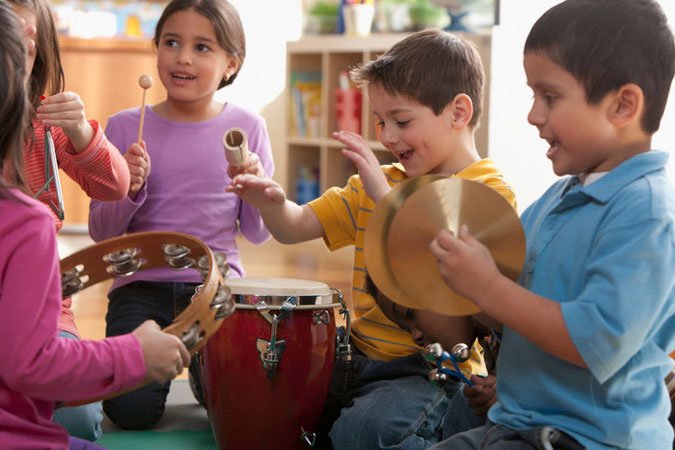Music for kids’ development is essential as it can help to foster physical, mental, and emotional growth. Music can help to stimulate physical development by getting kids to move to the rhythm and beat of the music. It can help to improve coordination, balance, and gross motor skills.
It can also help stimulate mental development by allowing children to express their thoughts and feelings. Children can learn about language, math, and problem-solving through music. It also helps to build listening, memory, and concentration skills.
Finally, it also fosters emotional development by providing children with an outlet for self-expression. It helps children understand and express their emotions and build self-esteem and confidence. Additionally, allowing children to bond with their peers and create relationships.
The benefits of music classes, instruments, and other structured forms of musical education for children.
Music for kids’ development has been proven to have many positive benefits. It can help them express themselves, develop creativity, and learn more effectively. Musical classes, instruments, and other structured forms of musical education can help children in several ways.
One significant benefit is increased academic performance. Research has shown that students who participate in musical classes have higher math and reading grades than those who do not. This is likely since these classes help students learn to focus and concentrate better and increase their problem-solving skills. It can also help students with memory recall, allowing them to retain the information they learn in school.
Another benefit of musical classes is improved emotional and mental health. It has been proven to reduce stress, improve mood, and increase self-esteem. Additionally, children learn to express themselves creatively and healthily.
Finally, music can help children develop social skills. Musical classes often involve working with other students, which can help children learn to work together and collaborate. Additionally, learning to work as part of a team can benefit students in other aspects of life.

How music can be incorporated into everyday life and help with academics, socialization, and overall development.
Studies have shown that listening to music can help improve focus and concentration and even increase children’s academic performance. Also, enhancing children’s social and emotional development, as it can help them learn to interact with others and build relationships.
Research has also indicated that music can help reduce stress, boost creativity, and improve mental health.
Music and Language Development
Music aids language development and can help kids learn new words to express themselves better.
Music has long been known to influence language development in children positively. Studies have shown that early exposure can help children develop more words, increase their vocabulary, and even form new connections between words. Music also allows children to express themselves creatively and practice their language skills.
Kids can learn to articulate their thoughts and feelings through singing, playing instruments, and dancing. For example, by using a karaoke machine or karaoke microphone and singing a song together, children can learn new words, develop their pronunciation, and practice their grammar. It also helps children learn a second language, as they may be more likely to remember words and phrases they hear in a song.
Music can also provide a fun and engaging way for children to practice their language skills. By using music in the classroom, teachers can help their students to stay focused and motivated while learning new words and expressions.

How music can help kids develop better motor skills and coordination.
Studies have found that music can improve coordination through the development of rhythm and timing, by enhancing the ability to concentrate and coordinate body movements, such as playing the piano, and by providing a fun way to practice coordination exercises.
It assists children in developing fine motor skills, such as handwriting, drawing, or playing the guitar, and gross motor skills, such as running and jumping. Using music to teach children motor skills, such as coordination and balance, can positively impact their development.
Musical activities, like clapping and tapping different objects, such as drums in time to a beat, can help children learn to coordinate their hands and feet while providing a fun way to practice coordination.
Additionally, musical games and activities can help children develop the mental and physical coordination needed to move their bodies with control and grace.
Music can nurture emotional development and help kids learn to express their feelings.
Music has long been a powerful tool for emotional development and expression, particularly for children. It can help children identify and express their feelings safely and constructively.
Music can also provide a calming and reassuring presence, helping children feel more secure and confident in handling difficult emotions. Research has even suggested that it reduces stress, improves cognitive performance, and promotes empathy.

Music can help with cognitive development and help kids think critically and solve problems.
Music is also a powerful tool that can help with cognitive development, critical thinking, and problem-solving in kids. Studies have found that it can help children improve their reading and writing skills, focus better and think more creatively. Listening to music can also help children develop their problem-solving skills and increase their understanding of math concepts.
Additionally, it can help children boost their memory recall and develop their auditory skills while providing a calming effect, assisting children in learning better, and providing an enjoyable and stimulating learning environment to help children with abstract thinking and understanding.
A Final Word
Music plays a vital role in a child’s development, as it allows children to express themselves, encourages creativity, and helps develop essential skills like problem-solving and critical thinking. It also helps foster a love of learning and can be used to engage children in meaningful conversations about the world around them.
Additionally, music can be used to help children develop self-discipline and a sense of responsibility. By incorporating music into a child’s everyday life, parents and caregivers can help foster a child’s growth and development constructively and positively.